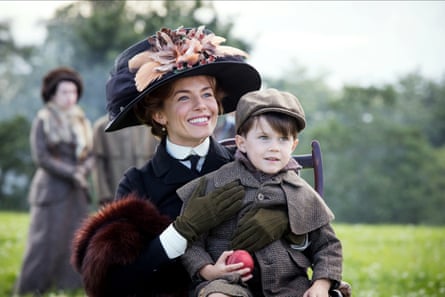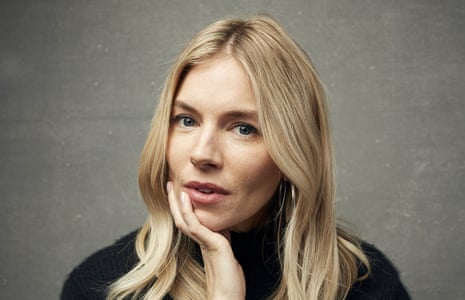No excuses for lateness in the era of Zoom, perhaps, but cut Sienna Miller some slack. The 39-year-old has just appeared on This Morning, where she struggled valiantly to pitch her new film Wander Darkly, in which she plays a woman who may or may not have survived a car crash. (“It’s really hard to describe!”) Then she dashed to the bathroom to scrape off all that TV-friendly makeup. Now here she is in her bedroom, with her fresh, non-shiny face framed by bright blond locks. “Like a normal person again,” she says cheerfully. Yeah, right.
Take her current lockdown viewing habits. In between homeschooling Marlowe, her eight-year-old daughter with her former partner Tom Sturridge, and shooting a six-part Netflix thriller, Anatomy of a Scandal, she has been watching the documentary Framing Britney Spears. She identifies with the public suffering of that beleaguered star. She even recognises the faces of individual paparazzo who once hounded and harassed her, too.
“Everyone in the culture was complicit in what was being done to girls in that moment,” she says, with an air of disbelief. “I was definitely a victim of that, and I couldn’t handle it. I don’t know how anyone could. It was assault. And I think the reaction from a lot of women under that kind of scrutiny at the time was to just lose it a little bit. You’re in a perpetual state of anxiety. You’re living this video-game existence, being hunted relentlessly. Watching the documentary, I could really relate to those moments where she cracks because it’s unmanageable. It is aggressive and terrifying and you lose control. That’s their intention.”
Miller could always have adapted her own behaviour. “I could have not gone out. Or not worn what I wanted. I could have changed my life in some way.” She smiles knowingly. “I just took them all to court instead.”
In 2008, she successfully sued several tabloids, using human rights legislation to secure her privacy. Three years later, she testified at the Leveson inquiry after winning £100,000 in damages from the News of the World, which had hacked her voicemail. Her preparation involved “sitting around the table with lawyers and barristers and having to deal with the ugliness, especially with Murdoch and the News of the World”. Files of emails revealed to Miller exactly how she was regarded by reporters at the paper. “The disgusting way they spoke about me, journalist to journalist. The lack of consideration that this was a human being.”
Sticking up for herself is in her nature, she says. “If someone backs me into a corner, I will fight my way out. I was young, and under real scrutiny at a moment where tabloid culture was destructive. I didn’t want it, I fought it legally, and I triumphed.”
In all the extracurricular furore that has surrounded her, it has sometimes been easy to forget she is an actor, and an exceptional one at that: unfussy, organic, authentic. Her “party girl” years have cast an unfairly long shadow, as has her former fashion icon status. I confess to Miller that I never realised boho chic – Ugg boots, disc belts, peasant tops – was all down to her. “You probably have Ugg boots, disc belts and peasant tops in your cupboard without knowing why,” she laughs. “And you’re welcome.” She still gets stopped by strangers more familiar with her wardrobe than her work. “They say: ‘I love your style!’ And I think: ‘What about my films?’”
What about them? Miller can render vivid the smallest parts, such as the sidelined wives in Foxcatcher, American Sniper and The Lost City of Z, or she can drive entire films, as she did when playing two real-life women maligned by their mentors: she was Edie Sedgwick, opposite Guy Pearce as Andy Warhol, in Factory Girl; then Tippi Hedren, under the beady eye of Toby Jones as Hitchcock, in the BBC drama The Girl. “I think my performance was appreciated,” she says of Factory Girl, “but the noise of everything else was louder. It was, like: ‘She can’t possibly be good and be doing all these other things.”

Wander Darkly, her new picture, really puts her through the wringer. It consists mainly of Miller and Diego Luna, as her partner, looking back on their relationship from some sort of limbo or purgatory, commenting on their different memories of the same events. Dream imagery predominates. One or both of them may be dead. Who knows? It would all be frightfully nebulous and New Age-y without Miller, who supplies the necessary emotional fibre.
No one is more surprised than she is that it turned out well. “It felt really clunky to make, and it took a lot of persuasion from the director to reassure us that this was not an absolute disaster. I felt lost, which served my character’s state of mind. I was hoping for a miracle in the edit.”
Miraculous would be an overstatement, but the film is certainly arresting. Past and present become indivisible; in one scene, water lapping at Miller’s feet is transformed into an ocean. “There was a crew member outside with a hosepipe spraying the water into the garage. I was barefoot, and the director was saying: ‘This will turn into the sea.’ And I was just looking at this man with a hose, and saying to myself: ‘There is no way, with the budget we have, that this is going to work.’ It required so much trust, and I did waver. I should’ve relaxed more.”
What was the problem? “I think I was mildly resentful because I had to give so much emotionally. I thought: ‘Oh God, what if I’m doing all this and it’s just, you know, a man with a hosepipe outside a garage?’” She says now that it was all worth it. “I like the stillness of the film, and how interior it is as a meditation on grief. I don’t know how many films stay in that space for so long.”
She has been vocal about the need for gender parity, so does she know what her co-star was paid? “I can tell you that Diego and I basically got nothing,” she grins. “With an independent film, you’re not doing it for the pay cheque.” Studios are another story. “When a studio is involved and it’s a demanding schedule and you know you’ll be leaned on heavily in the press tour, then I do believe that women should be compensated more than they have been in the past. I never really advocated for that before because I was always so fucking grateful to be working.”

What changed? “Really it begins with the individual understanding their own worth, which is something I’ve struggled with.” Her confidence was boosted by the behaviour of the late Chadwick Boseman, her co-star on the 2019 thriller 21 Bridges. When Boseman, who was also a producer on that movie, learned that the studio wouldn’t pay what Miller was asking for, he stumped up the difference himself. “His act of generosity was incredibly validating,” she says. “It was a total anomaly in Hollywood for someone to behave that way. But it was also very true to who the man was.”
Several years earlier, she had turned down what would have been her return to Broadway (she had played Sally Bowles in Cabaret there in 2015) over just such a dispute. The play in question was an equally weighted two-hander about sexual abuse. She was offered half the fee that her male co-star was getting.
The issue was equality, not asking-price. “I made it clear that I didn’t mind if their offer to me was halved, just so long as we both got paid the same. The play was about abuse, so you’re already in kind of an inferior position as the woman going in. And I knew it would be gruelling in the rehearsal process; I knew how I’d feel playing a person who’d been abused. Undeniably this other actor has a huge audience, but it was a different age and gender, so I’m sure I could’ve pulled my weight in terms of getting people in there. It was just rampant patriarchy rearing its head again.”

Did she expect her demands to be met? “Deep down I was thinking that if I stamped my feet, they’d do the right thing – and they didn’t. They moved on, and I missed out on a play I really wanted to do, which is sad. But there was a lesson in that for me, which is about starting to advocate for myself, and the self-worth that comes from that kind of behaviour.”
Whenever she demands or negotiates now, she notices something curious about her own psychology. “I spoke to my agents and my lawyer, who are all women, and I said: ‘OK, I’m going to go in and negotiate as if I’m a man.’ I had to get myself into the mindset of being male to even have those discussions. That’s another product of the patriarchy we’ve grown up in. It’s depressing that we accepted that, along with all the advances and the misogyny. We took it because that’s what we were raised in. But the world is changing.”
This is all excellent to hear, and long overdue, but perhaps the noise, positive though it is, may once again be in danger of drowning out the work. Before we say our goodbyes, I ask what her best film is. Without hesitation, she chooses American Woman, the 2018 drama where she was a working-class mother grappling for more than a decade with her daughter’s disappearance. “It felt like an Everest before I did it, and I was praying it would fall apart,” she says. “It was taking me into territory I didn’t want to imagine. But something happened that was magical, and whatever I needed was available to me on each day.”
In the final scene of that picture, Miller is shown kneeling in the woods while a tiny green caterpillar inches across her back. What’s that about? “Oh, metamorphosis!” she says brightly. “Just a little metaphor. Nice, isn’t it? It’s that idea that she is changing and she’s going to emerge, and have this whole new life.” She’s right: it is a nice image. But I don’t think we’re talking about caterpillars any more.
Wander Darkly is available on digital platforms from 8 March
